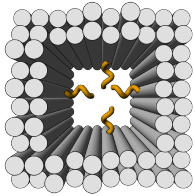Target: BSc IPSP and BSc Physics in 3rd to 6th semester. Priority will be given to 6th semester students.
Ziele:
The students will acquire knowledge and expertise on fundamental physical techniques that are important in the analyses and investigations of biological systems. They will also acquire introductory knowledge in the structure and function of biological materials. In addition, the students will acquire expertise in understanding, discussing and evaluating scientific literature in which the biophysical techniques are applied.
Lecture:
The lecture will focus on the various methods of biophysics that are fundamental in the analyses of biological systems and processes. The following topics will be dealt with:
- Structure of the cell
- Structure and dynamics of biomolecules
- Preparation and separation of biological molecules and complexes
- Mass Spectrometry
- Optical Spectroscopy (Absorption spectroscopy, Circular dichroism, Fluorescence spectroscopy, Vibration spectroscopy)
- Light Microscopy
- Atomic Force Microscopy
- Nuclear Magnetic Resonance
- Methods for structure determination (Electron microscopy, X-ray crystallography)
- Light- and Röntgen-scattering
- Calorimetry
- Numerical Methods for structure modeling and bioinformatics
Seminar:
- Analyses of publications and presentations on selected methods.
- Trainer/in: Hassan Alaa Youssef Amin
- Trainer/in: Treß Martin

Experimental Physics 2 module within the IPSP Bachelor course
Topic: "Thermodynamics and Electricity"
Summer semester 2022
- Trainer/in: Kemper Ulrich
- Trainer/in: Lühmann Friederike
- Trainer/in: Märcker Axel
- Trainer/in: Seidel Ralf
- Trainer/in: Welzel Fabian
no previous knowledge required
Open for bachelor students (3rd semester and higher) and master students
After active participation in the module, students will be able to apply advanced concepts of soft matter and biological physics to understand and quantify fundamental concepts as well as to develop according theoretical frameworks.
Lecture:
The lecture will address highly relevant and advanced topics of the field of soft matter and biological physics.
The following topics will be covered:
- Natural and synthetic semiflexible polymers (cytoskeleton & DNA nanotechnology)
- Statics and dynamics of networks/bundles of semiflexible polymers
- Non-affine & non-linear behaviors in soft matter
- Jamming transitions & glass-like behavior
- Non-equilibrium fluctuations
- Equilibrium self-assembly vs. non-equilibrium self-organization
- Plasticity
- Molecular motors & self-propelled particles
- Active soft matter (active actin structures & cells)
- Material properties in the development of tissues
- Neurophysics
- Physics of cancer
Seminar: Students will actively participate, e.g. giving talks or design posters about recent developments in the field- Trainer/in: Schnauß Jörg
- Trainer/in: Smith David
